Category Inclusion Show all
-
IDPwD 2025: Fostering disability-inclusive societies for advancing social progress (online panel)
Share IDPwD 2025: Fostering disability-inclusive societies for advancing social progress (online panel) on Facebook Share IDPwD 2025: Fostering disability-inclusive societies for advancing social progress (online panel) on Twitter Share IDPwD 2025: Fostering disability-inclusive societies for advancing social progress (online panel) on Linkedin Email IDPwD 2025: Fostering disability-inclusive societies for advancing social progress (online panel) link
Post-IDPwD 2025 Wrap-Up
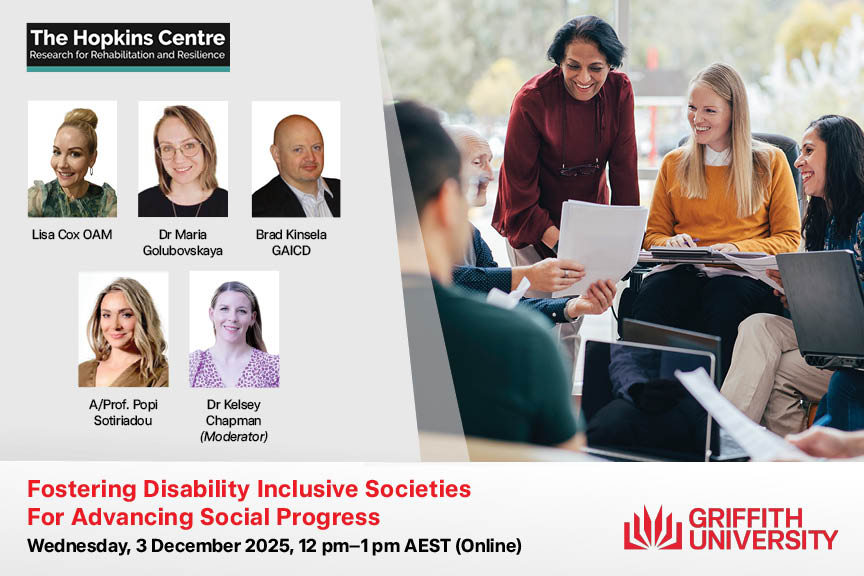
Thank you to everyone who joined us to mark International Day of People with Disability (IDPwD 2025). Our online forum—co-hosted by The Hopkins Centre, Inclusive Futures: Reimagining Disability, and the Griffith Business School—brought together an outstanding panel: Lisa Cox OAM, Dr Maria Golubovskaya, Brad Kinsela GAICD and A/Prof Popi Sotiriadou, moderated by Dr Kelsey Chapman.
Our speakers unpacked this year’s theme, Fostering disability-inclusive societies for advancing social progress, exploring opportunities for education, employment, business and community inclusion as we look ahead to Brisbane 2032.
If you missed the event, you can now watch the accessible recording and read the full transcript: https://youtu.be/1CtIb3MjHd0?si=dwtxovMtF3_I4Ffl
We also invite you to explore our HDR Scholars with Disability blog, showcasing lived-experience research shaping more inclusive futures at Griffith. https://inclusivefutures.griffith.edu.au/news/news_feed/idpwd-celebrating-our-griffith-university-hdr-disability-scholars
👉 View the video, transcript, and event recap: https://www.hopkinscentre.edu.au/news-view/international-day-of-persons-with-disabilities-538
More information:
Inclusive Futures: Reimagining Disability
inclusivefutures@griffith.edu.auFostering disability inclusive societies
for advancing social progressJoin us to mark the United Nations International Day of Persons with Disabilities on Wednesday, 3 December 2025 (12:00–1:00pm AEST) in our online forum hosted by Griffith Business School’s Equity, Diversity and Inclusion Committee, Inclusive Futures Reimagining Disability, and The Hopkins Centre.
This year’s theme Fostering disability inclusive societies for advancing social progress, offers an important opportunity to explore how we can create more inclusive communities as we head towards the Brisbane 2032 Olympic and Paralympic Games.
In Australia, one in five people experience disability and related barriers to meaningful employment. In this discussion, our panel will consider both the opportunities and challenges of fostering disability inclusion in Southeast Queensland—particularly in the areas of education, employment, volunteering, and business. We’ll also explore how mega-sporting events like Brisbane 2032 can be leveraged as tools for long-term social and economic progress, rather than producing only short-term, event-based opportunities.
You will hear from:
Lisa Cox OAM is an author, university researcher, TEDx speaker and internationally awarded thought leader. Her work is focused on epistemic disruption, leveraging the power and influence of industries like media and advertising to change social attitudes about disability while positively impacting social outcomes, like employment.
Dr. Maria Golubovskaya, Lecturer, Griffith Business School – researching youth and disability employment, hospitality work, and service worker wellbeing.
Brad Kinsela GAICD brings an extensive background as disability and social inclusion champion, qualified access consultant and board member/company director, Adjunct Industry Fellow at Griffith University, as well as an extensive career as a 'former' senior executive in the Government for over 26 years, including the Games Independent Infrastructure and Coordination Authority. Coming from a background of disability and human rights advocacy, lobbying, and community-based human services and practice, it is not surprising that Brad has maintained his connections, profile, and commitment to living in a society that values, services and embraces all members of communitySeparate from his public policy life, his love for family and friends and embracing the outdoor wonders of the world has seen Brad take his passion to have accessibility and inclusion as the 'norm' rather than the exception has taken him to many places, most notably Barcelona and Paris in 2025 during the Paralympic Games.
Associate Professor Popi Sotiriadou is a lecturer and researcher with the Griffith Business School and a distinguished international expert in managing high-performance sport and sports education. Her work focuses particularly on advancing women in sport, accessibility, and inclusive practices that ensure equitable participation and representation. Popi is the founder of Vision for Motion, an innovative app that promotes physical activity, wellbeing, and community connection for people with visual impairments.
The discussion will be moderated by Dr Kelsey Chapman, Research Fellow with Inclusive Futures: Reimagining Disability, whose work explores effective service delivery for people with disability, particularly in transport and health.
Accessibility will be a priority, with live captions available throughout the session. This event will also be recorded and shared post-event, along with a full transcript for those who could not attend via YouTube and our website.
More information
Inclusive Futures: Reimagining Disability
inclusivefutures@griffith.edu.auDr Millicent Kennelly – Griffith Business School
m.kennelly@griffith.edu.au -
IDPwD: Celebrating Our Griffith University HDR Disability Scholars
Share IDPwD: Celebrating Our Griffith University HDR Disability Scholars on Facebook Share IDPwD: Celebrating Our Griffith University HDR Disability Scholars on Twitter Share IDPwD: Celebrating Our Griffith University HDR Disability Scholars on Linkedin Email IDPwD: Celebrating Our Griffith University HDR Disability Scholars link
INTERNATIONAL DAY OF PEOPLE WITH DISABILITY 2025
Celebrating Our Griffith University HDR Disability Scholars
Fostering disability-inclusive societies for advancing social progress
Every year, the International Day of People with Disability (IDPwD) calls us to imagine what our communities could look like if inclusion wasn’t an afterthought, but the foundation of progress.
At Griffith University, we see this future every day in the work of our HDR Disability Scholars—researchers with disability who are reshaping how society thinks, designs, and acts. These scholars lead research that challenges outdated systems, advances accessibility, and centres lived experience as a vital source of knowledge.
Launched in 2023 through Inclusive Futures: Reimagining Disability and supported by The Hopkins Centre, the HDR Disability Scholars Program now supports a dynamic, growing cohort of talented PhD candidates across fields including health, technology, media, mental health, workplace equity, disaster communication, and identity studies.
The program complements the Griffith University Disability Scholars Research Scholarship (GUDSRS)—co-developed and administered by Professor Rebecca Ford, Dean of the Griffith Graduate Research School—which enhances opportunities for emerging researchers with disability by providing dedicated support for accessible and inclusive research pathways.
With mentorship, peer learning, accessibility support and a thriving community, the program reflects Griffith’s commitment to building disability-inclusive research environments—spaces where scholars not only participate, but lead.
As the world celebrates IDPwD 2025 and its theme Fostering disability-inclusive societies for advancing social progress, we proudly showcase the remarkable researchers driving this mission forward.
Watch on YouTube: https://youtu.be/1CtIb3MjHd0Download a copy of the Transcript: https://www.hopkinscentre.edu.au/news-view/international-day-of-persons-with-disabilities-538
Read more in the Griffith News: https://news.griffith.edu.au/2025/11/26/a-thriving-community-is-driving-inclusive-research-at-griffith/
 From top left to right: Daniel Clarke; Pallav Pant (Middle) together with his PhD supervisors Dr Feb Dwirahmadi and Dr Monique Lewis; Lisa Cox; and Jim Hogan.
From top left to right: Daniel Clarke; Pallav Pant (Middle) together with his PhD supervisors Dr Feb Dwirahmadi and Dr Monique Lewis; Lisa Cox; and Jim Hogan.MEET OUR SCHOLARS
 Allan (Ali) Khan
Allan (Ali) KhanAllan (Ali) Khan
Topic: Mental Health Distress and Disability Adjustments for PhD Students with Psychosocial Disabilities
Ali’s research shines a light on the mental health challenges faced by PhD students—particularly depression, anxiety, and suicidality—and how structural issues such as funding insecurity, academic culture and institutional policy can exacerbate distress. His work seeks to co-design stronger disability adjustments and support systems across Australian universities.
Ali says:
“PhD students are the backbone of Australia’s university workforce… Universities must provide inclusive structures that support students and researchers with disabilities, ensuring all PhD students can thrive.”
His research directly contributes to disability-inclusive learning environments—an essential foundation for social progress.
Find out more: https://www.hopkinscentre.edu.au/project/mental-health-distress-and-disability-adjustments-178
 Aron Mercer
Aron MercerAron Mercer
Topic: Neurodivergent Employees, Workplace Disclosure and Belonging
Aron explores the workplace experiences of neurodivergent employees, particularly the complexities of disclosure and the impact on belonging, career pathways and wellbeing. With 15–20% of people being neurodivergent, his research addresses one of the most significant—and least understood—equity challenges in employment.
Aron shares:
“It was daunting at first, but I could not recommend the Griffith University HDR program strongly enough… I have valued the support and connections with other doctoral candidates.”
His work advances the IDPwD theme by advocating for workplaces where neurodivergent employees can contribute without fear or stigma.
 Lisa Cox OAM
Lisa Cox OAMLisa Cox OAM
Topic: The Visibility of Disability — Representation, Identity and Advocacy
Award-winning author, advocate and media professional Lisa Cox OAM is investigating how representation shapes disability identity, advocacy, and employment. Through a practice-led approach combining memoir writing, critical disability studies and media analysis, she explores the tension between visibility and invisibility—and why the risk of being unseen is far greater.
Her research challenges industries to adopt inclusive, authentic representation that supports both social and economic participation.
Find out more: https://inclusivefutures.griffith.edu.au/news/news_feed/celebrating-lisa-cox-oam-advocate-changemaker-and-trailblazer
 Pallav Pant
Pallav PantPallav Pant
Topic: Advancing Accessible Emergency Communication for Deaf and Hard of Hearing Communities
Pallav’s internationally recognised work tackles one of the most urgent equity issues in disaster response: inaccessible emergency communication. His research co-designs digital, two-way communication tools with Deaf and Hard of Hearing communities and emergency services to ensure no one is left behind in a crisis.
This research exemplifies disability-inclusive innovation and has the potential to save lives across Australia and globally.
Find out more: https://inclusivefutures.griffith.edu.au/news/news_feed/congratulations-to-pallav-pant-on-his-phd-confirmation-seminar
 Julia Robertson
Julia RobertsonJulia Robertson
Topic: WATCH — Wearable AI Technology for Cognitive Health
Julia examines how wearable AI technologies can support real-time mental health monitoring for people with brain tumours—populations with significantly elevated risks of depression and suicidality. Her framework integrates biometric data, AI prediction models and patient-reported outcomes to create proactive, personalised mental health care.
Julia reflects:
“The unwritten rules of academia… are often inaccessible by design. When you live with disability, you learn to navigate these spaces creatively.”
Her work pushes the boundaries of inclusive digital health and human-centred AI.
 Samantha Cronin
Samantha CroninSamantha Cronin
Topic: Undiagnosed Neurodiversity in Australian Defence Force Medical Transitions
Samantha’s research investigates whether undiagnosed neurodiversity contributes to the challenges veterans face when transitioning from the ADF to civilian life. Her work connects military culture, mental health, disability identity and reintegration—areas historically overlooked.
Samantha says:
“Griffith’s HDR program empowers researchers with disability to turn lived experience into leadership.”
Her research supports more responsive, neuroinclusive veteran services.
 Hannah Simmonds
Hannah SimmondsHannah Simmonds
Topic: Leisure Access and Social Inclusion for Young People with Disability
Hannah explores how young people with disability experience leisure spaces, what barriers they face, and what inclusive design looks like from their perspective. Her work informs future planning for accessible, welcoming, community-building leisure environments.
Hannah shares:
“I love learning and feel like I am contributing with my lived experience expertise.”
Her research highlights that inclusion is not only a right—it enriches community life.
Find out more: https://www.hopkinscentre.edu.au/project/social-access-and-social-inclusion-outcomes-for-179
 Janine Shepherd AM
Janine Shepherd AMJanine Shepherd AM
Topic: Narratives in Liminal Spaces — Identity, Disability and Resilience
Janine’s autoethnographic research introduces Conscious Liminality™, a framework for using personal narrative as a tool for rebuilding identity and resilience after trauma. Her work demonstrates how lived experience can reshape scholarly knowledge and challenge dominant assumptions about disability.
Janine says:
“As a disabled scholar, I’ve learned that research is not separate from lived experience—it’s born through it.”
She represents the power of storytelling in advancing social understanding and change.
Find out more: https://janineshepherd.com/conscious-liminality/
 Jim Hogan
Jim HoganJim Hogan
Topic: Reimagining Agile for Neuroinclusion
Jim is developing a new neuroinclusive “Agile” playbook—one that centres epistemic justice, inclusive collaboration, and innovation. His work challenges traditional organisational structures and opens new pathways to accessible, creative, high-performing workplaces.
Find out more: https://tedxbrisbane.com.au/our-talks/jim-hogan/
 Daniel Clarke
Daniel ClarkeDaniel Clarke (HDR Applicant for 2026)
Topic: Transforming Community Transport
Daniel, 2021 Queensland Young Australian of the Year and co-founder of Tears in the Jungle, has completed influential research on community transport, revealing how funding models and system gaps create barriers for people with mobility challenges.
He has applied to join the HDR Disability Scholars Program in 2026, proposing a PhD on transport disadvantage and the economic and social costs of inadequate accessible transport. With Transitcare as an industry partner, his future research aims to drive large-scale change across Queensland and beyond.
Find out more: https://inclusivefutures.griffith.edu.au/have-your-say-in-transforming-community-transport
WHY THIS WORK MATTERS FOR IDPWD 2025
The theme of IDPwD 2025—Fostering disability-inclusive societies for advancing social progress—is not just a goal. It is the everyday practice of our scholars.
Their research:
- redesigns unjust systems
- expands accessibility
- amplifies lived experience
- challenges stereotypes
- innovates new technologies
- builds more inclusive policy and practice.
Their leadership shows that when people with disability lead research—not just participate in it—societies advance.
LOOKING AHEAD: HDR DISABILITY SCHOLARSHIPS 2026
We are excited to announce that multiple 2026 HDR Disability Scholarships will open soon. These scholarships provide financial support, research allowances, and inclusive flexibility for PhD candidates with disability.
More information will be released at the end of the year—follow us to stay updated.
BE PART OF THIS MOVEMENT
If you're a person with disability interested in pursuing research, we would love to hear from you. Join a growing network of scholars driving change locally, nationally, and internationally.
Together, we’re building a future where inclusion drives progress—and where researchers with disability shape the world we all share.
📩 Contact: inclusivefutures@griffith.edu.au
🌐 Follow us on LinkedIn: https://www.linkedin.com/showcase/inclusive-futures-reimagining-disability/?viewAsMember=true
📰 Subscribe to our eNews: https://inclusivefutures.griffith.edu.au/monthly-roundup📰 Subscribe to The Hopkins Centre Wrap Up: https://www.hopkinscentre.edu.au/wrapup
🤝 Join the Inclusive Futures community: https://inclusivefutures.griffith.edu.au -
Disability Action Week: Driving Inclusion through Research and Innovation
Share Disability Action Week: Driving Inclusion through Research and Innovation on Facebook Share Disability Action Week: Driving Inclusion through Research and Innovation on Twitter Share Disability Action Week: Driving Inclusion through Research and Innovation on Linkedin Email Disability Action Week: Driving Inclusion through Research and Innovation link
This year, Disability Action Week invites all of us to rethink how we communicate, build meaningful connections and create more inclusive environments. At Griffith University—where 12% of our students identify with disability and over 40% of these students have a neurological condition—this work is already well underway. As an inclusive university and employer, Griffith continues to invest in research, innovation and student-led design to support our growing neurodivergent community.
Below, you’ll find a snapshot of the latest research, initiatives and student insights shaping more responsive teaching, accessible systems and stronger pathways for neurodivergent learners and HDR scholars. Dive into the sections that interest you—or read the full story of how Griffith is driving inclusion through evidence, empathy and action.
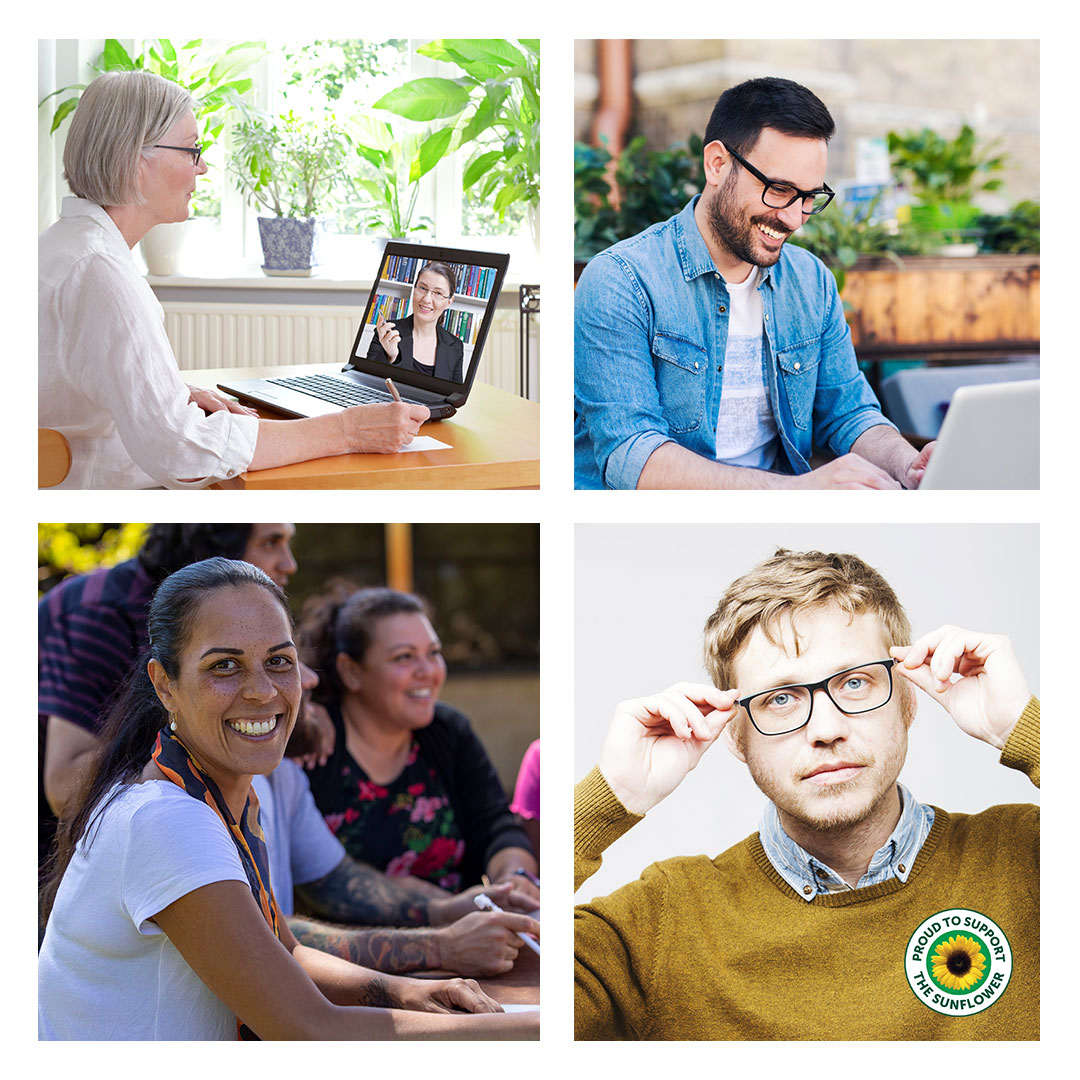
Using AI to Help Teachers Support Neurodivergent Students
A recent study by Dr Michelle Ronksley-Pavia, Mr Steven Ronksley-Pavia and Prof. Chris Bigum explores how generative AI (GenAI) can be used to design personalised learning experiences for twice-exceptional and multi-exceptional neurodivergent students.
In simple terms, twice-exceptional and multi-exceptional students are people who are both gifted and have one or more disabilities (such as ADHD, autism, dyslexia, or other cognitive or physical disability). They have strong abilities or potential in some areas but also have challenges in others. Their learning needs are more complex because several conditions interact at the same time.
These students have unique strengths and unique challenges. They need learning environments that recognise what they can do really well, while also giving the right support where they may face challenges.
In small-scale experiments, the researchers used GenAI to “rehearse” different pedagogical strategies based on synthetic (but realistic) multi-exceptional student profiles, enabling them to reflect on and potentially adapt teaching practices in a more tailored way.
Key findings include:
- GenAI-supported rehearsal gives educators a relatively safe, low-risk way to experiment with differentiated strategies before applying them with real students.
- The process helps in visualising and anticipating diverse classroom needs, particularly for students whose profiles may combine high ability or potential with other challenges (“twice-exceptional,” e.g., gifted + disability).
- Ethical and pedagogical implications are raised: how to ensure AI-designed scenarios do not reinforce stereotypes, bias, or narrow assumptions about neurodivergent students.
- The researchers argue for a human-centred approach: the goal is not to replace teacher judgement but to augment it, using GenAI to better inform inclusive and responsive instruction.
Why this matters for Disability Action Week (“Communicate. Connect. Create.”):
Communicate: This research highlights new ways for educators to communicate with themselves (through rehearsal) and with diverse student needs. By simulating real-world neurodivergent profiles, teachers can better understand and anticipate student experiences, strengthening communication, support, and expectations.
Connect: Using AI to co-design or rehearse learning experiences fosters a deeper connection between teachers and the lived realities of neurodivergent students. It creates a bridge for empathy, insight, and shared understanding.
Create: The study embodies innovation: creating tailored, inclusive pedagogies through GenAI platforms can develop teacher capacity and capabilities to reimagine how they teach and support neurodivergent students. It aligns with inclusive futures by showing how technology can be harnessed to design more equitable education.
For Griffith University, where inclusion of students and HDR scholars with disability (including neurodivergent students) is a key priority, this research offers practical, future-forward strategies:
- It suggests a model for professional learning: teachers could use GenAI platforms in their own development, rehearsing inclusive practices in low-risk environments.
- It supports Griffith’s goals of universal design for learning by reinforcing teacher adaptability to neurodiverse needs.
- It helps foreground the voices and needs of twice-/multi-exceptional students, often underrepresented in standard pedagogical planning, reinforcing institutional commitment to meaningful inclusion.
Read more: https://journals.sagepub.com/doi/full/10.1177/1932202X251346349
Championing Neurodivergent Researchers Across Higher Degrees
Researchers Dr Chris Edwards and A/Prof Kate Simpson recently contributed to a systematic review examining the experiences of neurodivergent higher degree research students.
Their work highlights that many neurodivergent researchers bring valuable strengths to their fields, such as creativity, deep focus, innovative thinking and unique problem-solving approaches. However, the review also shows that universities are often not structured with these strengths or needs in mind. Neurodivergent research students frequently encounter unclear expectations, sensory overload in shared offices and labs, and administrative processes that assume everyone works and communicates in the same way.
They emphasise that inclusion must extend beyond offering individual accommodations. Instead, universities need to create accessible systems and environments that recognise, respect and value neurodiversity. This would not only better support neurodivergent researchers but also help strengthen research culture more broadly. Their findings reinforce the spirit of Disability Action Week: when institutions genuinely embrace different ways of thinking, everyone benefits.
Leveraging Students’ Voices and Designing for Diversity
Considering how research can drive efforts for inclusion, engaging with the experiences and perspectives of students is crucial. Researchers A/Prof Stuart Woodcock and Elizabeth Hitches have explored student perspectives on university support services and unveiled important findings in relation to students’ stress during their higher education journey.
The researchers found that students with accessibility requirements and/or disability (ARD) may have higher levels of academic stress than their peers, even when they were receiving academic accommodations (Hitches et al., 2023). This stress can have negative impacts not just for learning, but for students’ physical and mental health. What this illustrates is that stress may be an important equity consideration, and reducing unnecessary stressors may be an important aspect of designing for diversity. Proactively reducing barriers to access, engagement, and performance for students, such as through an Universal Design for Learning approach to courses, may assist with meeting students’ diverse needs from the outset.
Completing this, students offered suggestions for strengthening and enhancing available student support, considerate of the high demand support services are under (Hitches et al., 2025). Overall, students recommend accessible, personalised and student-centred support, which facilitated their own sense of agency and empowerment. Students also highlighted the importance of the affective experience when accessing accommodations. In students’ accounts, it was just as important as the tangible accommodations received.
One important conclusion from these studies is that by leveraging students’ voices, the higher education sector can gain deeper insight into ways to support more inclusive experiences for students, reducing unnecessary stressors and empowering students to reach their full potential.
Supporting Our Growing Neurodivergent Student Community
Twelve percent of Griffith University students identify with a disability. Of these, more than 40% said that they have a neurological condition, which encompasses autism, ADHD and other neurodivergences. The Griffith University Student Disability and Accessibility Team are looking for new and innovative ways to respond to the needs of this growing cohort. In addition to reasonable adjustments such as extensions, quieter rooms for exams and assistive technologies, the following neuroaffirming initiatives are underway:
Advocate-ED Program
Griffith University has partnered with Empower Autism to deliver free, on-campus workshops for autistic students to build skills in self-advocacy, collaboration and self-reflection. These workshops are delivered by autistic facilitators, with future workshops in peer advocacy and leadership coming soon.
ADHD101
In 2026, students will be able to join ADHD101 – a free support group for students with ADHD developed by Curtin University. The weekly sessions focus on the many strengths of students with ADHD and shares successful strategies and support.
Hidden Disabilities Sunflower Network – making the invisible visible
Like many disabilities, neurodivergence is not always immediately obvious to others. For some people, this can make it hard to understand and believe that someone with a “non-visible” condition genuinely needs support. Simply by wearing a Sunflower lanyard or pin, people with hidden disability can indicate that they may need extra help, understanding, or just more time.
When a business joins, they commit to training their entire workforce using the Sunflower training suite - to know what the Hidden Disabilities Sunflower is, and to have a broad understanding of hidden disabilities and be confident to support someone wearing it. Griffith has just started this process and is excited to share more information in the coming months – stay tuned.
For more information contact: Lizzy King, Senior Disability Advisor - Student Disability and Accessibility at lizzy.king@griffith.edu.au
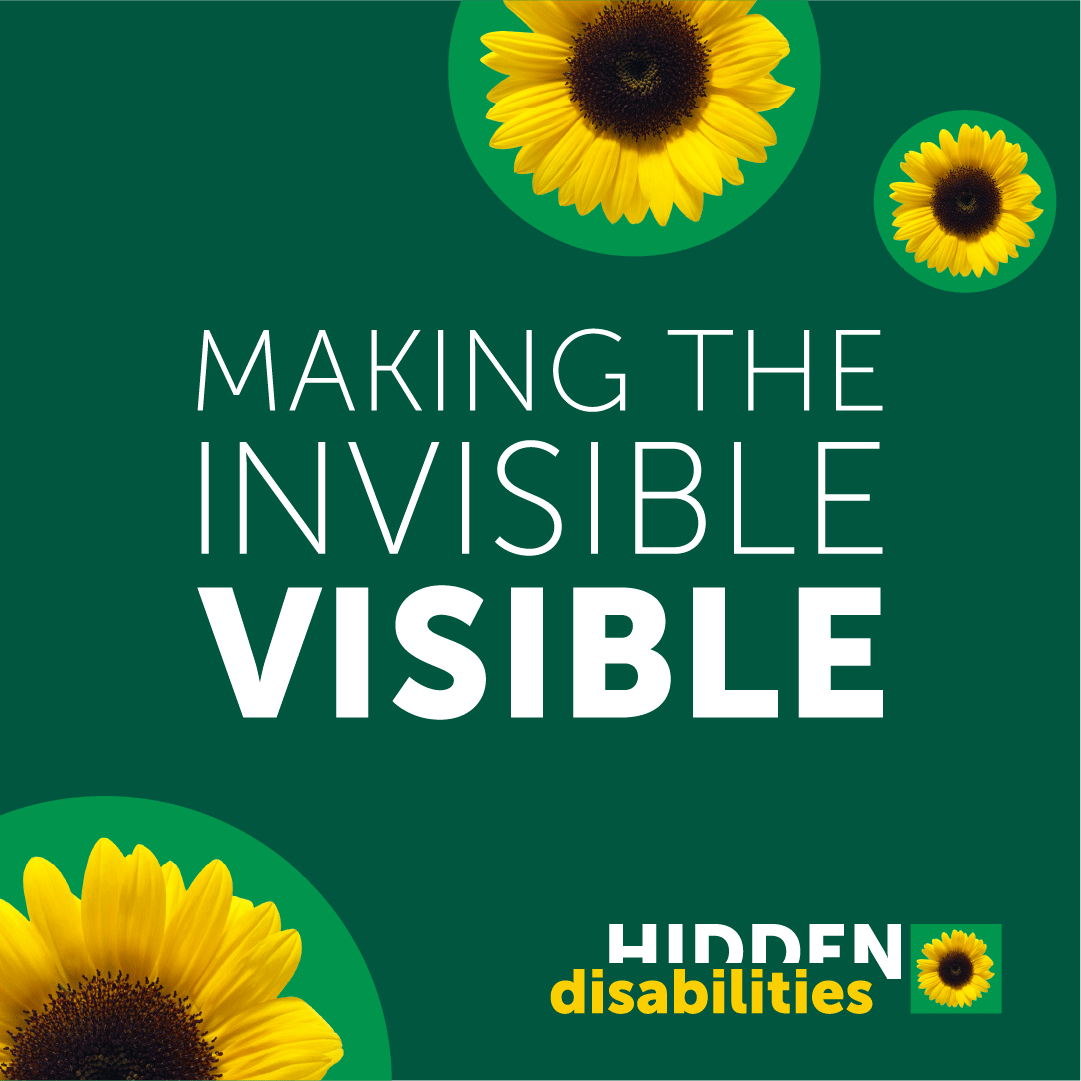
Citations
Ronksley-Pavia, M., Ronksley-Pavia, S., & Bigum, C. (2025). Experimenting With Generative AI to Create Personalized Learning Experiences for Twice-Exceptional and Multi-Exceptional Neurodivergent Students. Journal of Advanced Academics, 36(4), 601– 639. https://doi.org/10.1177/1932202X251346349
Tan, D. W., Edwards, C., Mewburn, I., Simpson, K., Webster, A. A., & Brownlow, C. (2025). Understanding the experiences of neurodivergent research students: a mixed methods systematic review. Studies in Higher Education, 1-17.
https://doi.org/10.1080/03075079.2025.2573209Hitches, E., Woodcock, S., & Ehrich, J. (2023). Shedding Light on Students with Support Needs: Comparisons of Stress, Self-Efficacy, and Disclosure. Journal of Diversity in Higher Education, 16(2), 205-214. https://doi.org/10.1037/dhe0000328
Hitches, E., Woodcock, S., O’Sullivan, K & Ehrich, J. (2025). Leveraging students' voices: understanding ways university support services can strengthen student support. The Australian Educational Researcher, 52, 583-605. https://doi.org/10.1007/s13384-024-00731-2
-
Disability Action Week 2025: Communicate. Connect. Create.
Share Disability Action Week 2025: Communicate. Connect. Create. on Facebook Share Disability Action Week 2025: Communicate. Connect. Create. on Twitter Share Disability Action Week 2025: Communicate. Connect. Create. on Linkedin Email Disability Action Week 2025: Communicate. Connect. Create. link
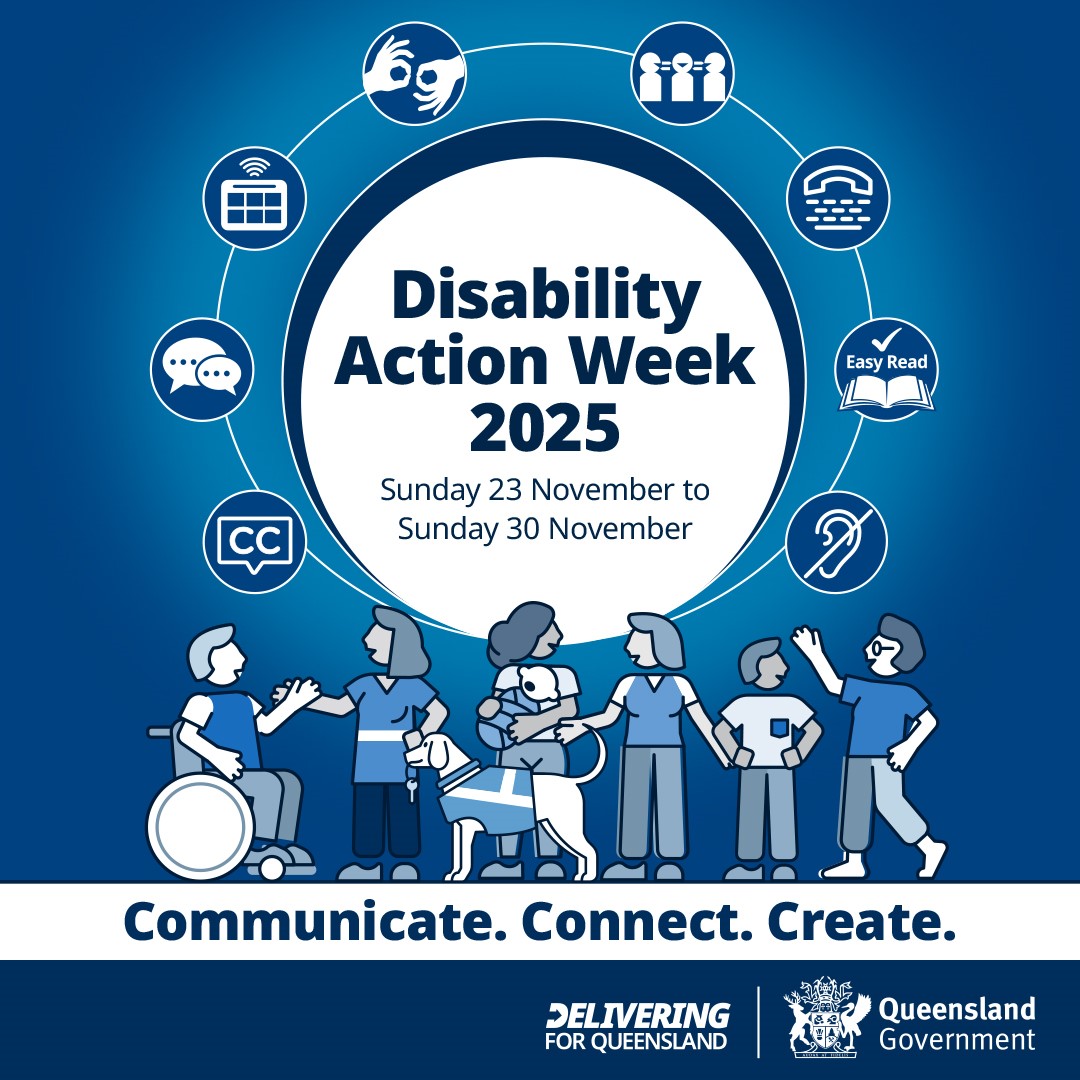
Disability Action Week is a statewide celebration of accessibility, inclusion and the simple actions we can all take to make Queensland a place where everyone can participate fully. This year’s theme — Communicate. Connect. Create.— encourages all of us to put accessible communication into practice and recognise its role in building stronger, more inclusive communities.
Small changes matter. By making information easier to understand, offering alternative formats, improving event accessibility, or taking the time to ask someone about their communication preferences, we help create environments where everyone feels welcome, respected and supported.
Shining a Spotlight on Hopkins Research
The Hopkins Centre is a leading translational research centre in disability and rehabilitation, based at Griffith University and Princess Alexandra Hospital. Our work focuses on finding practical solutions to complex challenges through interdisciplinary, collaborative and responsive research that is embedded directly in practice.
While disability and rehabilitation research rarely makes headlines in the same way that medical breakthroughs do, it is essential work. Because we work alongside people with disability, their families, clinicians, policymakers and service organisations, we see firsthand where innovation is needed — and we act on it.
We are committed to valuing the voice of people with disability in every stage of decision-making and discovery. Their insights shape our research, guide our priorities and ensure we develop solutions that genuinely improve quality of life.
We regularly produce accessible and alternative-format resources, co-design tools with end users, and embed accessibility in all engagement — from Easy Read and plain language materials to inclusive events, captioning, Auslan, and culturally appropriate communication approaches.
This year, we are highlighting three impactful projects: co-designing communication tools for people with spinal cord injury, developing accessible sleep resources for people with SCI, and strengthening mental health support pathways for PhD students through inclusive, evidence-based approaches.
We need your support to continue designing high-quality solutions, services and systems that make a real difference.
To get involved or explore current research opportunities, visit hopkinscentre.edu.au/participate-research or email hopkinscentre@griffith.edu.au.SPOTLIGHT PROJECTS FOR DISABILITY ACTION WEEK
1. Co-designing Communication Tools in the Spinal Injuries Unit
Clear and respectful communication is essential in healthcare, especially for people with complex communication needs. We are partnering with people with spinal cord injury, families, clinicians and lived-experience researchers to co-design a new communication resource for the Metro South Health Spinal Injuries Unit.
Join our online co-design workshops (Microsoft Teams):
- Patients & Families: Thursday 4 December, 12pm
- Staff: Monday 8 December, 10am
Register your interest: https://inclusivefutures.griffith.edu.au/siu-info
Contact: Dr Kelsey Chapman (Research Fellow) – dignityproject@griffith.edu.au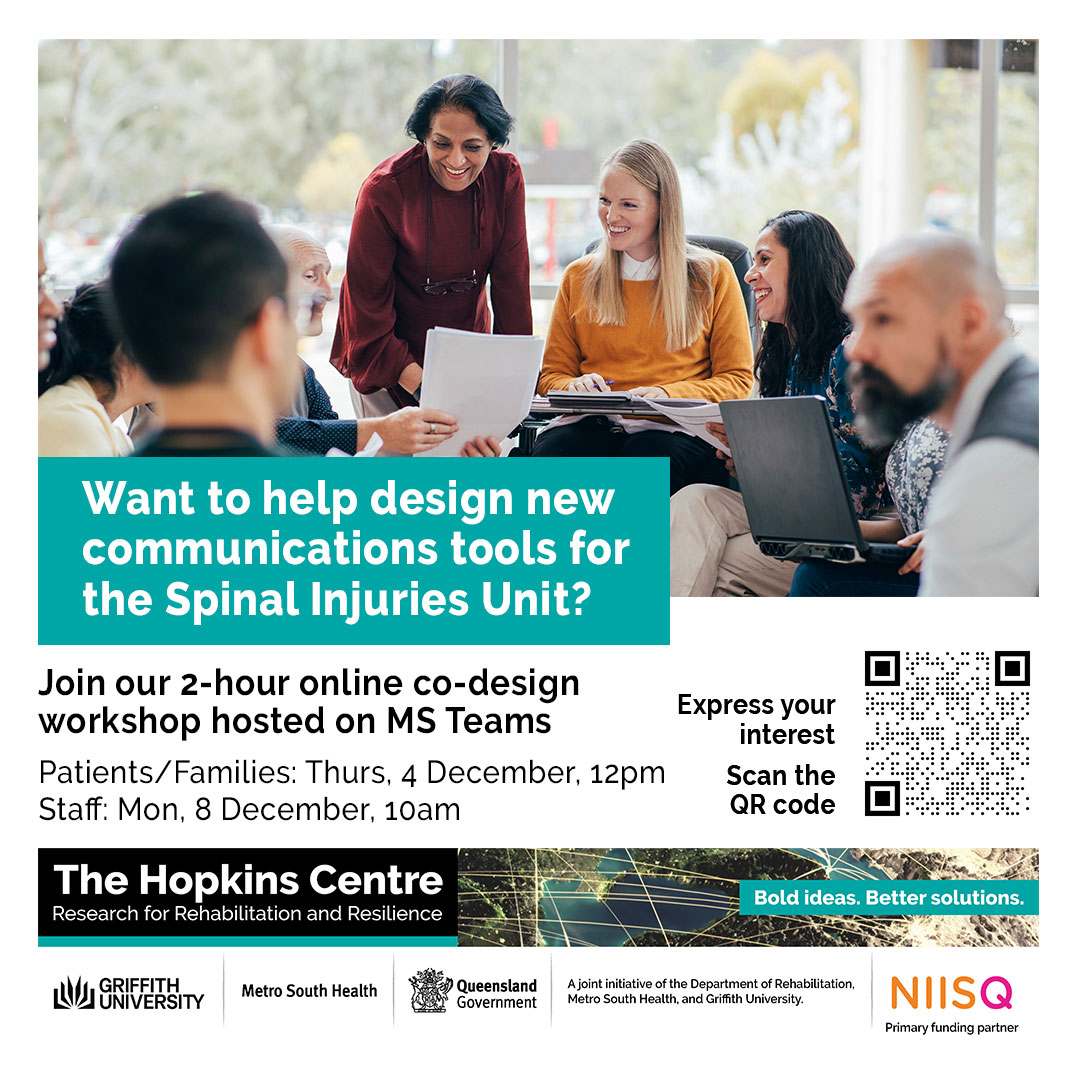
2. Sleep and Spinal Cord Injury
Poor sleep affects two in three people with spinal cord injury, yet many do not receive the support they need. Dr Emily Bray and her team at The Hopkins Centre, together with Spinal Life Australia, the Institute for Breathing and Sleep and QSCIS, have co-designed new evidence-based resources to help people understand sleep changes and explore strategies that support better rest and wellbeing.
Communicate: This project aims to raise awareness of sleep issues following SCI and to share the best ways to manage them from the perspectives of people with SCI and healthcare professionals.
Connect: Researchers, clinicians, and people with SCI collaborated through a series of co-design workshops to identify how to address SCI-specific sleep issues and their preferred approaches to managing them.
Create: The main result of this project has been the creation of co-designed sleep management resources tailored to the needs and preferences of people with SCI.
Key findings and solutions include:
Sleep issues following SCI emerge early after the injury and persist throughout life. It is crucial to raise awareness among people with SCI and clinicians about the harmful effects of poor sleep quality, the causes of sleep disturbances, and possible solutions. Participants suggested various solutions, including early and routine assessments, as well as educational resources that researchers and clinicians could explore to address these issues.
Learn more and access the resources:
https://www.hopkinscentre.edu.au/project/seed-project-sleep-disturbances-following-spinal-163Contact Dr Emily Bray:
https://www.hopkinscentre.edu.au/people-view/emily-bray-177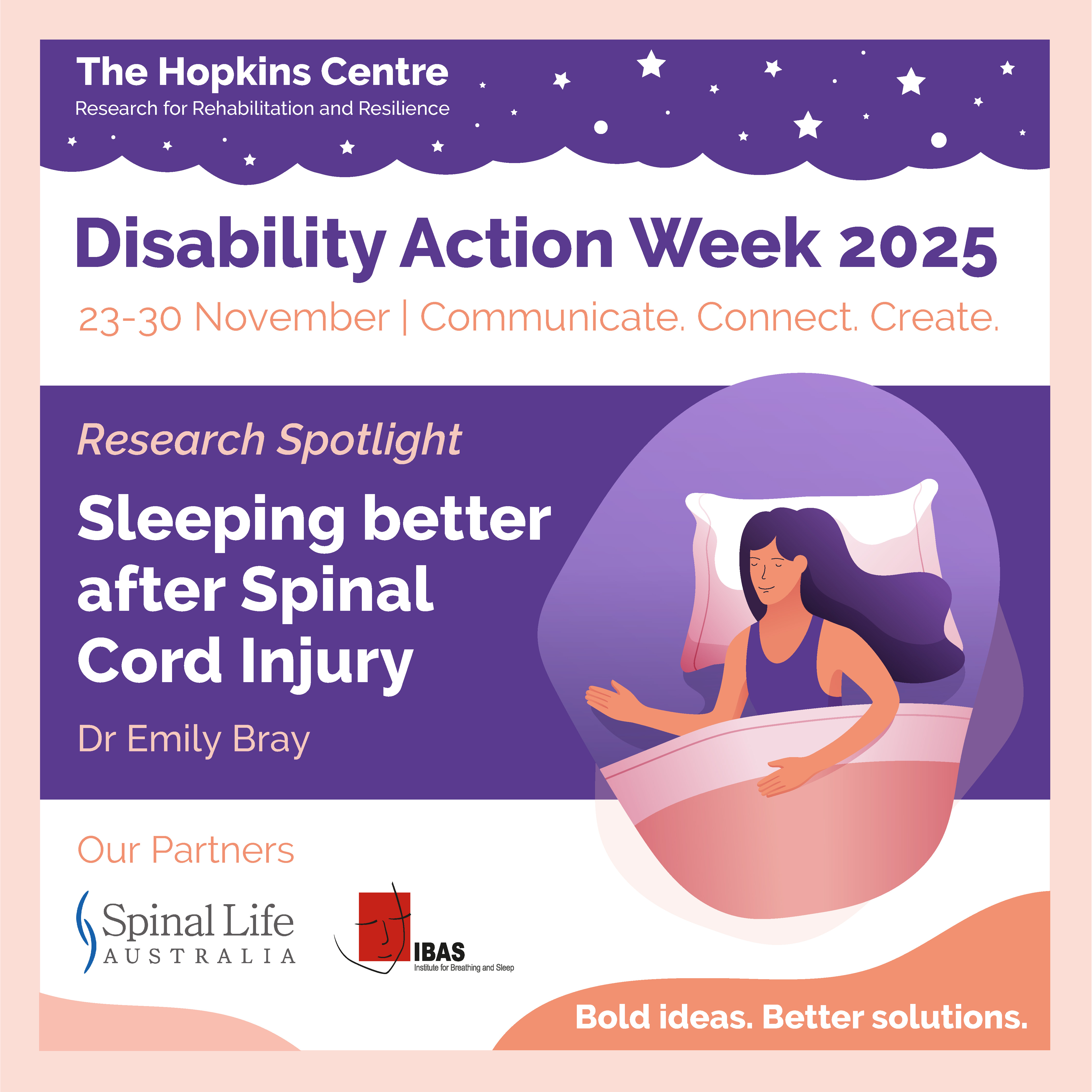
3. Creating Supportive Pathways for PhD Student Mental Health
Behind the prestige of a PhD lies a hidden mental health crisis. Many candidates face severe distress, driven by isolation, financial pressure, and perfectionism, with research suggesting up to one-third meet suicide-risk criteria. PhD researcher Ali Khan at The Hopkins Centre focuses on better mental health support and adjustments for PhD students, particularly those with psychosocial disabilities.
Communicate: The project aims to break the silence around PhD mental health, fostering open communication between students, supervisors, and institutions to remove bureaucratic barriers to support.
Connect: By bringing together all the key stakeholders, the research builds connections to combat isolation and create a collaborative, supportive academic community.
Create: The goal is to create practical, systemic solutions and more inclusive policies that support the mental well-being and academic success of all PhD students.
Key findings and solutions include:
- Key Risks: Loneliness, impostor syndrome, financial instability, and supervisor-student misalignment are major predictors of distress.
- Effective Strategies: Digital mental health tools, peer financial mentoring, and therapeutic approaches like music therapy show significant promise as accessible, low-cost interventions.
Learn more and access resources:
The Research Project: Improving Mental Health Accommodations for PhDs
Contact Ali Khan: ali.khan3@griffithuni.edu.au
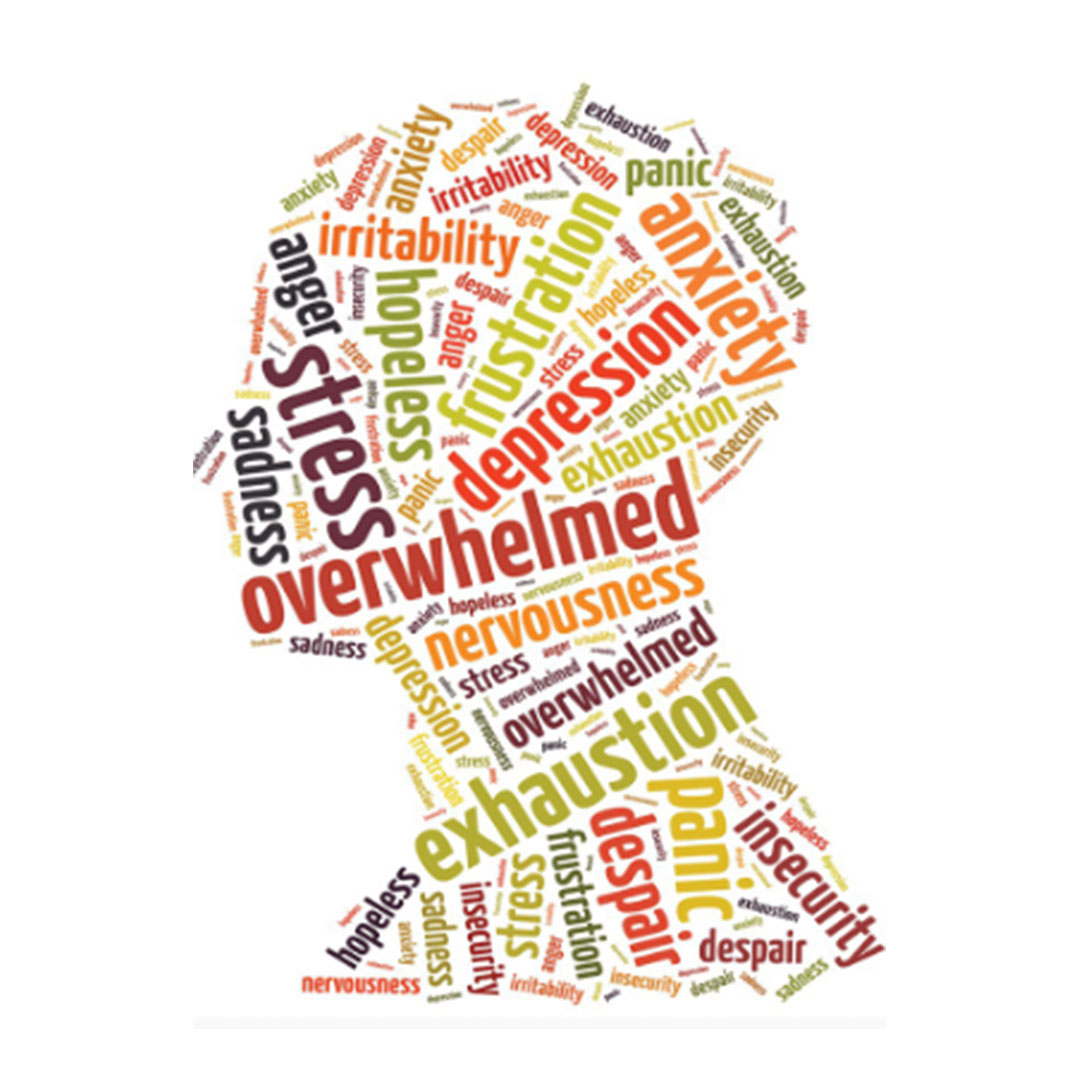
-
Celebrating our HDR Disability Scholars
Share Celebrating our HDR Disability Scholars on Facebook Share Celebrating our HDR Disability Scholars on Twitter Share Celebrating our HDR Disability Scholars on Linkedin Email Celebrating our HDR Disability Scholars link
Building inclusive research pathways at Griffith University
Education is more than a privilege—it’s a pathway to possibility.
At Inclusive Futures: Reimagining Disability, we’re proud to support Higher Degree by Research (HDR) students with disability to reach their goals and contribute to bold, innovative research that reimagines inclusion in action.
Since launching in 2023, our HDR Disability Scholars Program has grown into a thriving community of ten (10) diverse researchers at different stages of their PhD journeys. The program provides more than just academic support—it builds meaningful connections through peer learning, mentoring, and shared experience in an environment where accessibility and inclusion are built into everything we do.
This thriving community is championed by Professor Rebecca Ford, Dean of the Griffith Graduate Research School, and Dr Lisa Stafford, ARC Future Fellow—both strong advocates and mentors for the Scholars, in addition to their supervisors. Julia Robertson, newly appointed Co-Chair of the Higher Degree Research Candidate Representative Consultant Committee (HDRCRCC)—a sub-committee of the Board of Graduate Research (BGR)—also plays a key role in championing inclusive research pathways and student representation. Together, their leadership and commitment to accessibility and inclusion have been instrumental in creating an environment where our scholars can thrive.
Last week, we celebrated this community at the Disability Scholars Day 2025: A Showcase of Excellence, held at Griffith University’s Logan campus and online. The hybrid event brought together students, supervisors, and researchers for a day of inspiration and connection.
Highlights included milestone presentations from Lisa Cox OAM, Aron Mercer, and Samantha Cronin (Early Career Research Milestones), and Ali Khan (Thesis Confirmation Research Milestone). Their presentations sparked lively discussion and showcased the breadth of disability-focused research being undertaken at Griffith—research that’s challenging assumptions and creating real-world impact. Events like this highlight the incredible progress and potential of our HDR scholars. They remind us that when we design for inclusion, we enable excellence.
 Griffith University HDR Students with Disability (Clockwise from top left) - Daniel Clark; Pallav Pant together with his supervisors Dr Feb Dwirahmadi and Dr Monique Lewis; Lisa Cox; and Jim Hogan.
Griffith University HDR Students with Disability (Clockwise from top left) - Daniel Clark; Pallav Pant together with his supervisors Dr Feb Dwirahmadi and Dr Monique Lewis; Lisa Cox; and Jim Hogan. We’re also excited to offer HDR Disability Scholarships for future students. These scholarships provide financial support, research allowances, and flexibility for candidates with a permanent disability who demonstrate exceptional research potential. Multiple scholarships will be available in 2026, with announcements coming at the end of the year. It’s one more way we’re ensuring talented researchers have the opportunity to thrive and lead change.
If you’re a person with disability interested in pursuing higher degree research, we’d love to hear from you. Join a growing network of passionate scholars who are shaping the future of inclusive research.
📩 Contact us: inclusivefutures@griffith.edu.au
🌐 Follow us on LinkedIn, subscribe to our eNews or become a member of our Inclusive Futures community to stay updated on scholarship announcements, research highlights, codesign and citizen science opportunities and upcoming events. -
Inclusive Futures Book Club Wrap-Up: A Conversation with Ken Brandt
Share Inclusive Futures Book Club Wrap-Up: A Conversation with Ken Brandt on Facebook Share Inclusive Futures Book Club Wrap-Up: A Conversation with Ken Brandt on Twitter Share Inclusive Futures Book Club Wrap-Up: A Conversation with Ken Brandt on Linkedin Email Inclusive Futures Book Club Wrap-Up: A Conversation with Ken Brandt link
 Ken Brandt, author of 'Positive Vision'.
Ken Brandt, author of 'Positive Vision'.It was a delight to host Ken Brandt, author of Positive Vision: Enjoying the Adventure and Advantages of Poor Eyesight, at our recent Inclusive Futures Book Club event.
Ken opened with a powerful reflection on how medical advances at the time of his premature birth allowed him to retain some vision—an outcome shaped by the evolving understanding of oxygen therapy in newborns.
Ken’s story is one of courage, humour, and a zest for life. He shared how his mother’s unwavering support instilled in him an attitude to give anything a go, encouraging him to pursue adventure while being kind to himself when things didn’t go as planned. From learning to parachute to navigating life with low vision, Ken offered a refreshing perspective on how disability can shape, but not limit, one’s experiences.
Attendees were clearly engaged, asking thoughtful questions about community perceptions of disability. Ken responded with insight and warmth, furthering our collective understanding of how embracing diversity leads to a more inclusive world.
Ken’s book Positive Vision is available in hard copy, electronic, and audio formats at many online and physical bookstores. He is also available for public speaking engagements. For more information, visit www.kenbrandt.com.
A heartfelt thank you to Ken for sharing his story and helping us continue the conversation around disability, inclusion, and positive living.
View on YouTube: https://youtu.be/XWfJiHEZFTw?si=fYJWO5Ej9O45n-ca
-
Voice of Queenslanders with Disability 2025
Share Voice of Queenslanders with Disability 2025 on Facebook Share Voice of Queenslanders with Disability 2025 on Twitter Share Voice of Queenslanders with Disability 2025 on Linkedin Email Voice of Queenslanders with Disability 2025 link
 Help Amplify the Voices of Queenslanders with Disability
Help Amplify the Voices of Queenslanders with DisabilityWe are excited to announce that the Voice of Queenslanders with Disability Survey 2025 is now live! This vital research, led by The Dignity Project at Griffith University, provides an opportunity for Queenslanders with disability, their families, carers, and organisations to share their experiences, helping to shape a more inclusive and accessible future.
We are proud to collaborate with Queenslanders with Disability Network (QDN) and the Queensland Government’s Department of Families, Seniors, Disability Services, and Child Safety to ensure that lived experiences are heard and inform future policies and programs.
We would greatly appreciate your support in promoting this survey through your networks. You can help by:
- Taking the survey: https://inclusivefutures.griffith.edu.au/hub-page/vqd
- Sharing the survey via email, newsletters, or your social media channels
- Sharing our social media: https://shorturl.at/0oFD6
- Forwarding this information to any citizen researchers, colleagues, or community members who may be interested
- Encouraging participation in alternate formats or through phone/virtual interviews
Survey closes: Wednesday, 30 April 2025
Accessible and alternate formats are available to ensure everyone has the opportunity to participate.
We appreciate your help in spreading the word so we can reach as many voices as possible. Together, we can work towards a more inclusive Queensland.
For more information, please contact us at inclusivefutures@griffith.edu.au.
Thank you for your support!
Dr Kelsey Chapman
Research Fellow
The Dignity Project
Inclusive Futures: Reimagining Disability -
Moving Beyond Awareness: A Strengths-Based Approach to Autism Support
Share Moving Beyond Awareness: A Strengths-Based Approach to Autism Support on Facebook Share Moving Beyond Awareness: A Strengths-Based Approach to Autism Support on Twitter Share Moving Beyond Awareness: A Strengths-Based Approach to Autism Support on Linkedin Email Moving Beyond Awareness: A Strengths-Based Approach to Autism Support link
April is Autism Awareness Month, a time to celebrate the diversity and contributions of Australia’s autistic community. With over 290,900 autistic individuals across the country, the conversation is evolving—moving beyond awareness toward understanding, inclusion, and meaningful action.
On 2 April, World Autism Understanding Day (#WAUD2025), we are reminded that true inclusion starts with how we see, support, and empower autistic individuals. A growing body of research is challenging traditional models of autism assessment and support, advocating for a strengths-based approach.
WHY THIS MATTERS NOW:
The National Autism Strategy (2025-2031)As Australia prepares to implement the National Autism Strategy (2025-2031), integrating research-backed, person-centered approaches like this framework is crucial. By shifting towards strengths-based assessments, we can create a more inclusive society—one where autistic individuals are supported to live the lives they choose.
HOW YOU CAN MAKE A DIFFERENCE:
Learn & Share – Amplify research that promotes strengths-based, individualised support.
Listen to Autistic Voices – Inclusion starts with understanding lived experience.
Advocate for Change – Support workplaces, schools, and communities in adopting strengths-based approaches.
Autism Awareness Month is about more than recognition—it’s about real change. By embracing research-driven, strengths-based approaches, we can build a future where every autistic person is valued and empowered.
👉 Please share this research to help shift the conversation beyond awareness to action!
MORE INFORMATION:
The Hopkins Centre
hopkinscentre@griffith.edu.au -
Empowering Health Communication: Co-Designing with People with Disability
Share Empowering Health Communication: Co-Designing with People with Disability on Facebook Share Empowering Health Communication: Co-Designing with People with Disability on Twitter Share Empowering Health Communication: Co-Designing with People with Disability on Linkedin Email Empowering Health Communication: Co-Designing with People with Disability link

📚 Authors: Dr Kelsey Chapman, Dr Connie Allen, Prof. Elizabeth Kendall AM GAICD
📅 Published: 9 February 2025
📖 Journal: Journal of Health Communication
🔗 DOI: https://doi.org/10.1080/10810730.2025.2462679How can we make health communication truly inclusive? A recent scoping review by Inclusive Futures: Reimagining Disability researchers explores the power of co-designing health initiatives with people with disability—not just for them.
Key Insights:
Inclusive Participation: Engaging people with disabilities from the outset ensures their voices shape accessible, effective health communications.
Diverse Methods: From workshops and focus groups to participatory action research, different co-design approaches foster genuine collaboration.
Enhanced Outcomes: Inclusive approaches improve the quality of health information, empower participants, and build trust in health initiatives.
This research reinforces that co-design isn’t just best practice—it’s essential. When health communication is built with the community, it becomes more impactful, equitable, and transformative.
More Information:
Dr Kelsey Chapman
Inclusive Futures: Reimagining Disability
Griffith University
k.chapman@griffith.edu.auProf. Elizabeth Kendall AM GAICD
e.kendall@griffith.edu.au
-
New publication: Tech-Enabled Inclusion – Leveraging Social Media to Empower Neurodivergent Employees in the Workplace
Share New publication: Tech-Enabled Inclusion – Leveraging Social Media to Empower Neurodivergent Employees in the Workplace on Facebook Share New publication: Tech-Enabled Inclusion – Leveraging Social Media to Empower Neurodivergent Employees in the Workplace on Twitter Share New publication: Tech-Enabled Inclusion – Leveraging Social Media to Empower Neurodivergent Employees in the Workplace on Linkedin Email New publication: Tech-Enabled Inclusion – Leveraging Social Media to Empower Neurodivergent Employees in the Workplace link

Can social media help make workplaces more inclusive for neurodivergent employees?
A new study by the Centre for Work, Organisation and Wellbeing (WOW) at Griffith University, explores how social media can help create workplaces where everyone's unique way of thinking is valued. The researchers, Dr Maria Khan, Dr Carys W Chan, Dr Hongmin (Jess) Yan and Dr Sudong Shang, present a new framework that clarifies how technology could make a real difference for neurodivergent employees.
The study explores how digital communication tools can empower neurodivergent employees (NDEs) by providing:
- Psychological safety – A space where employees feel comfortable being their authentic selves.
- Accessible communication – Social media allows for asynchronous interactions, reducing the pressure of real-time conversations.
- Representation and visibility – NDEs can share their experiences, connect with peers, and advocate for workplace changes.
- Empowered participation – Digital platforms offer new ways to engage in decision-making and collaboration.
However, challenges remain—privacy concerns, inconsistent support, and workplace barriers still exist. Organisations must take intentional steps to leverage technology effectively, foster inclusive leadership, and understand the specific needs of neurodivergent employees.
When inclusion is done right, everyone benefits. 🌍✨
Read more: https://onlinelibrary.wiley.com/doi/10.1002/hrm.22290
More information:
Dr Maria Khan, Research Fellow
Centre for Work, Organisation and Wellbeing (WOW)
Inclusive Futures: Reimagining Disability
Griffith University
maria.khan@griffith.edu.auhttps://www.linkedin.com/in/maria-a-khan/
Citation:
Khan, M., Wen Chan, X., Yan, H., & Shang, S. (2025). Tech-Enabled Inclusion: Leveraging Social Media to Empower Neurodivergent Employees in the Workplace. Human Resource Management, https://doi.org/10.1002/hrm.22290






